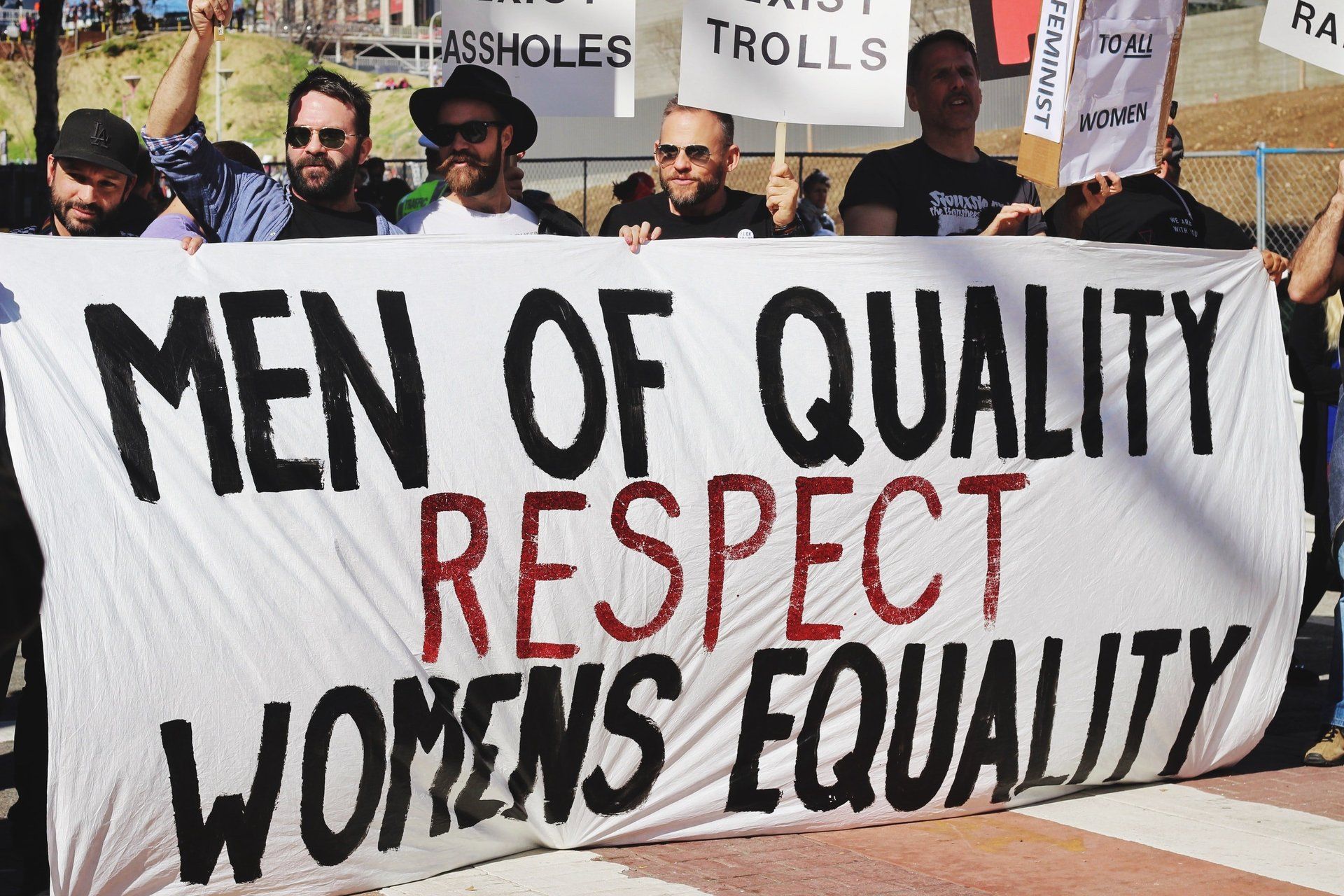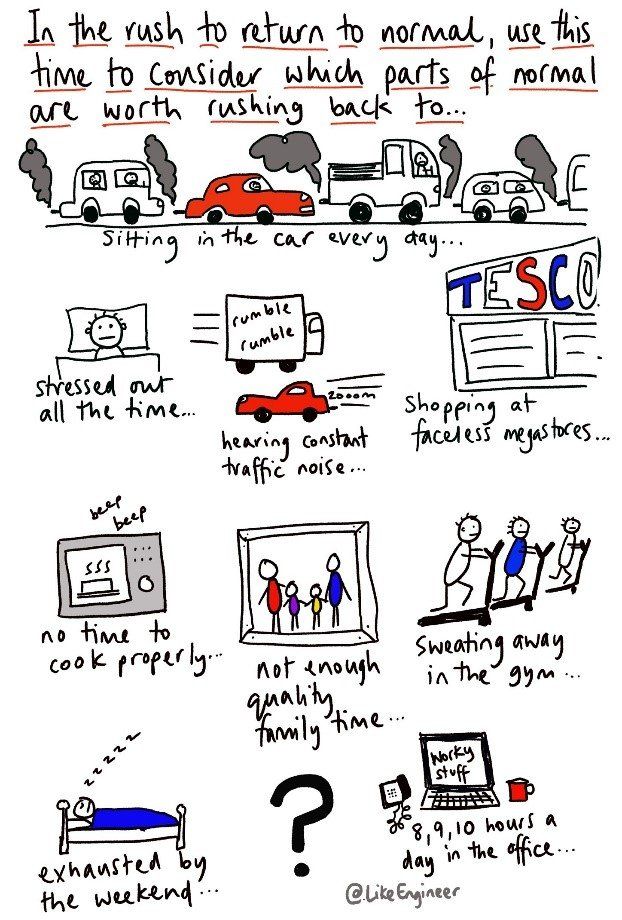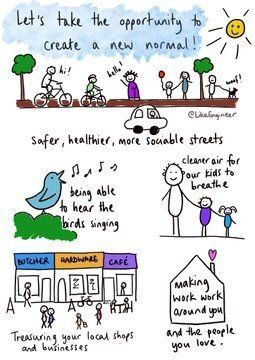one key move to #buildbackbetter
Right now, we are at an inflection point. A point where we could find ways back to the way things were or an opportunity to think about a different future, a better future. Listening to the rhetoric and reading the headlines it seems that only a slow return is on offer. The reported focus is ending the lockdown, to get back to how we were.
But the question hanging in the air is, “Should we really go
back to how it was?”
@likeengineer drew ‘a thing’. Here at SHERPA we think that the thing they drew (above and below) summed up, for many, the things we have realised that are important and are necessary. Clean air, better balance, thinking local and acting global. For those of us who can work from home, can afford to buy from specialist independent local retailers it will be hard to go back to the way things were and probably quite easy to live a new, and better, normal. However, to get to a different, better, future for all in our very unequal society will involve trialling big new ideas. If we had to pick one big idea, one that might make the most difference then it would be to introduce a Universal Basic Income model.
Beyond the Furlough Phenomenon
One of the most important measures to coincide with Lockdown was the introduction of the Job Retention Scheme (aka Furlough), protecting people and jobs – providing a much-needed breathing space financially for those whose world changed overnight. This week the Chancellor has helpfully extended the scheme, in a more flexible form, until October 2020. While this is very welcome, it sets us up to hope that that everything will revert to how it was. However, the unspoken reality is that, for many, the extension of furlough is simply delaying the inevitable.
The change in the way services operate and the decrease in demand for others will lead to thousands of redundancies. Mass, sudden redundancies will create a significant welfare bill, compounded with worsening health (mental and physical) of the population. This does not sound like a positive ‘new normal’ or the wellbeing economy that some are beginning to talk about now.
In the absence of a plan for the ‘new normal’, and without a clear idea of the skills needed to deliver a positive and bright new post-lockdown future we should use the extended period of furlough to form a bridge to Universal Basic Income(UBI). We believe that UBI will provide recipients with dignity, opportunity, and choice.
UBI is a safety net that provides every workless citizen with a minimum income – not means tested, not classist, not conditional. It is progressive, sustainable and will fit with our dynamic ‘new normal’. Proponents argue that it is simple to understand and administer, but importantly reduces income and health inequalities in support of a fairer society. Detractors point out the cost and that it is a ‘freeloaders charter’.
Perceptions are important. In extraordinary times, a right-leaning government has introduced a furlough scheme that is almost universally supported, what better time to migrate to a UBI model. Other countries, like Finland have trialled UBI with positive impacts for employment and wellbeing. So while there is a desire by some to be ‘lockstep in Lockdown’, there is also a recognition of regional. and national differences within the UK. The First Minister has signalled her growing interest in the idea, but to trial such a scheme is not the gift of a devolved parliament. However, perhaps it is time to test out a new big idea, after all there is precedence (the less welcome #polltax trial springs to mind)
The proposition is simple and urgent.
·Pick an area - a country e.g Scotland, or a city eg Dundee or a neighbourhood eg. Wester Hailes (Edinburgh)
·Transition on a financial sliding scale to introduce a new UBI from the end of Furlough. Eg. Introduce a taper that takes the current ceiling of £2500 pm to a floor of c £1000- £1200 pm with a corresponding removal of other welfare payments. (We are not pitching the precise amounts here but there are clearly those in HM Treasury or Scottish Government analysts that could model the numbers)
·Allow recipients to work, to study, to recuperate, to volunteer, to access business start-up help.
·Motivate recipients to work, to study, volunteer and start-up in skills gap areas (for example care, nursing, tech)
·Rather than signing on and sanctions. Provide access to coaching and support.
·Baseline employment, employability, welfare cost and health status and review in 2023.
This pandemic has brought to the fore what we value in society. If we bounce back to what we knew, based on the existing economic paradigm we are headed for a car crash and a consequential welfare epidemic at huge cost to the taxpayer. Before the pandemic we were heading into a significant skills gap challenge, all that has happened is that this has slowed down for now. We know that if people have time to reskill, do something different with the time available – knowing what work is likely to be there – old work in new ways as well as new work, then we keep the economy growing in the right way and the wellbeing of people at the centre of this.
We know because we in SHERPA have been there and done this sort of work before, through the establishment of the much lauded healthcare academy models across NHSScotland; a route for those furthest away from education and employment into jobs and successful careers with benefits for them and their families but also for the wider economy in reskilling people, reducing welfare reliance and corresponding improvements in health and wellbeing – limiting the drain on the NHS. These were models that we helped to pioneer in our previous day jobs. The academies go from strength to strength and continue to be a key part of the workforce supply for health and social care.
Let’s step up, not bounce back
There will be many that will want to disagree, so let them offer different or better solutions. This is a chance for us to try something new, something better.
We’d love to talk more, whether to bounce ideas about the ‘new normal’ or have a chat about our approach to workforce planning, we can’t wait to hear from you and organise a virtual coffee and a very real discussion.
Alex Killick is Director of SHERPA. He was until earlier this year Director of People at Glasgow Caledonian University and member of the Scottish Living Wage Leadership Group.









